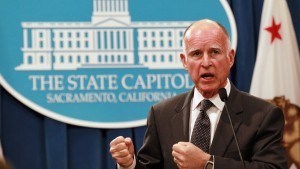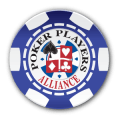

Poker Business Scandals in 2015: Crime, Controversy, and Crooks
December 28th, 2015
California Governor Jerry Brown caused plenty of controversy when he appointed his chief press secretary to the position of chairman of the Gambling Control Commission due to the appointee lacking any experience whatsoever in the industry. (Image: Getty/ktla.com)
Poker business scandals go hand-in-hand with America’s favorite casino card game, the allure of striking it rich often too tempting for the immoral to resist.
Similar to any other industry where great stacks of money are involved, greed intersected business owners and enticed poker players to call rather deceptive moves in 2015.
2011 was arguably one of the most scandalous years in poker history, the United States federal government seizing the assets of PokerStars and Full Tilt on what became known as the game’s Black Friday.
Though 2015 did not have a headline of such consequential nature, poker maintained its bad boy image at times thanks to these five eye-grabbing cover stories.
#5. CHIPCO Goes to Jail
CHIPCO, a now-defunct poker chip production company based in Maine, made headlines in March when it was revealed its owner John Kendall was charged with numerous charges including tax evasion, theft by withholding taxes, conspiracy to commit tax evasion, and making false statements on his income tax return.
Once a leading chip company, Kendall was sentenced to 10 months in jail and ordered to pay $51,663 in restitution.
The company was sold and renamed Game On Chip, one of its first orders coming from the Borgata in response to the Christian Lusardi scandal.
#4. Brown-Nosing Gov. Brown
California is poised to join Nevada, New Jersey, and Delaware in offering online poker in 2016, but the new chairman of the state’s Gambling Control Commission (GCC) will be learning on the job.
Governor Jerry Brown (D) raised eyebrows when he appointed his outgoing press secretary Jim Evans to the role of gambling boss in the Golden State.
Evans’ resume includes writing for the Sacramento Bee and serving in a variety of communication capacities for state senate members and agencies.
What it doesn’t include is any experience with gambling or control. His annual salary as of his June appointment is $138,867.
#3. PokerStars Bot Scandal
In June, PokerStars faced controversy after it was revealed a suspected bot was used to win $1.5 million in pot-limit Omaha on $0.50/$1 and $1/$2 tables.
The scandal led to the world’s largest online poker network placing a blanket ban on all tracking software and third-party programs.
PokerStars Head of PR Michael Josem said, “We work very hard to stay ahead of people who attempt to violate our rules… we continually upgrade our detection capabilities in attempt to stay ahead of the bad guys.”
#2. Amaya Ransacked
In December of 2014, Quebec authorities raided the headquarters of Amaya just months after the gaming company acquired PokerStars and Full Tilt for $4.9 billion.
The investigators were reportedly looking into allegations of insider trading leading up to the mammoth transaction.
Two months later in February, the US-based Financial Industry Regulatory Authority also opened a formal probe. Though no page was left unturned, no charges were ever brought against Amaya’s leadership and the company’s new subsidiaries received approval in New Jersey on September 30.
#1. Micon Pleas
The juiciest story of the year involved Bitcoin innovator Bryan Micon’s home being swooped in February by armed law enforcement officials with a search warrant from the Nevada Gaming Commission.
Though he wasn’t charged at the time or arrested, the Seals With Clubs chairman fled to Antigua to live in a land free of a police state. However, he willingly returned to Nevada in July to face his accusers.
In the end, the Bitcoin poker pioneer pled guilty to one felony charge for operating an unlicensed interactive gaming website. Micon remains a free man on the white sandy beaches of Antigua.















0 Comments